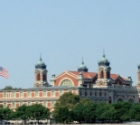
A view from the deck of the ship, Boudicca, as it cruised past the island of Capri.
It’s a little churlish to carp about a free cruise, but, despite our sense that we had won the lottery, Martin and I were a bit apprehensive before our last voyage on a Norwegian liner full of Scottish passengers. Lately I’ve been lucky enough to land a dream job – lecturing on literature on the high seas – and in return I get a free cruise for two; my husband is happy to come along for the ride. This year, however, we embarked only a few days after the flotilla had made headlines in seas closer to home, and we were nervous about the welcome we would get on board. We even considered, (for a nano-second, but still), saying that we were from England and South Africa instead of from outside Tel Aviv, for the sake of a laid-back, non-political two week break. Obviously we nixed that idea; I’d spent years pretending I wasn’t from South Africa, and we’re proud of living here. But how sad is it, to even contemplate that fleeting, defeatist thought.
Our cruise left from Greenock near Glasgow; the passengers were almost all Scottish. Average age: 70; retired judges, doctors, and businessmen. Almost all were Protestant Christians; a minority were Catholics. Then there was the classical guitarist from London – a “Jew-Bud” he called himself – a Jewish Buddhist. And us, Martin and me, the lone Israelis on board; Jewish, Jewish, Jewish.
Gulp.
Wimbledon swung into action on our first day at sea, and I needed to watch. My tennis partner was sitting on the stands in London at that moment; she smashes me anyway, almost every week, without the added advantage of getting tips from the experts. At least, I felt, I must see the games on TV. A very elegant man in grey hair and a smart suit was sitting in the lounge; I asked if I could sit on a vacant chair next to him in front of the screen. “Sure you can,” he said, in a friendly, Scottish voice. And then the dreaded question: “And where might you be from?”
Double gulp.
“I’m from Israel,” I said, in a come-on-and-hate-me-if-you-like kind of voice.
The man jumped up and grabbed my arm with both his hands. Martin was way down at the other end of the room; I didn’t know whether to squeak out for help, or suffer in silence. I wondered whether he was going to hurl me out of the lounge, or chuck me overboard … but he was smiling broadly, and in an even broader Scottish accent he was saying: “Good for you! I’m on yerrr side.”
The trip was an eye-opener for us. First of all we learnt that some of the Scottish hate the British, and long for independence of their own. Secondly we learnt that there is a Protestant/Catholic history there too – not just in Northern Ireland. And we discovered that as Jews we are so much “the Other” that no matter how many martinis we sip together at sunset in the Jacuzzi, or how much bridge we play round the same table, we remain a little bit different. Take Bob, for example.
Bob was the comedian on our cruise: Liverpudlian, in his seventies, working class. He came to all my Shakespeare lectures, crashed out through most of them, but was awake long enough to hear me discussing Shakespeare’s agenda. I saw that he was puzzled. “Why did you say Shakespeare had a gender?” he asked me, at last. “Wasn’t it obvious that he was a man?”
He was being serious.
Bob had a weekly stand-up performance, and I thought he should have included that line; he had a different plan. “Listen tonight, carefully,” he told Martin and me, the eve of his final show. “I’m going to tell a Jewish joke tonight.” And he did. This is it: “A Jewish man is giving it to his girlfriend one afternoon” (here supply the requisite crude hand-in-fist gestures … and repeat.) “Giving it to his girlfriend.” Loaded pause. “Well, he’s a Jewish person. So he’s lending it to his girlfriend.”
Jewish.
Lending, not giving. Get it?
The line was met by gales of laughter.
After the show Bob came up to us, beaming. “Did you like my joke about the Jewish person?” he asked, sure that we did. We were the only Jews on board, remember, expect for the Jew-Bud, and the whole entertainment crew was waiting for my answer. “Umm,” I said. “No. I didn’t really like it.”
Bob was crestfallen. “You didn’t?” he said. “Why not?”
That was the interesting part. I told him that it was offensive, no? To Jewish persons, as it made out that they were all stingy. It was a bit racist, didn’t he think?
I might as well have been talking about agendas. Bob didn’t know what the hell I meant. Nor did any of the others. To them Jews are stingy and mean. It’s not even pejorative, just a fact. A fact to make fun of.
“I’ll tell you a real Jewish joke,” I volunteered, to lift the atmosphere. So I told them the classic Sadie story – where her son, the President of the United States, invites her for Thanksgiving. He has a solution for all her gripes – too expensive to get from her home in Queens to JFK Airport? – he’s the president, he’ll send a limo. Too difficult to get a flight to Washington? He’s the Pres. he’ll send Air Force One. Too costly to stay in a hotel? Presidents of the United States can offer accommodation at the White House. He’s the President of the United States. He’ll helicopter her home. Sadie agrees to go.
The next day she meets her friend Rosie at the beauty parlor. “Ah, Sadie,” says Rose. “And vere are you going for T'anksgiving?”
“To my son,” says Sadie.
“The doctor?” asks Rosie.
“Nah,” says Said. “The other one.”
It’s hard to describe what happened next. Picture this: me, deadpanning the
punch line, and a large group of people standing around, waiting for it still to come.
Silence.
Dead, dead silence.
“Uh, Pam,” said Sue, a travel agent on board, “what’s the end of the joke?”
“You’ve just had it,” I said.
It turns out that you do have to be Jewish after all, to understand Jewish
jokes.
This encapsulated our experience on board – we’re the same, the same, the same; until we are different. It’s not like in Shakespeare’s time, when Jews were thought to smell different, look different, and be physically in league with the Devil himself. Today most Brits don’t think that Jews have horns (although in 100 percent of the cases where I’ve lectured about ‘Shakespeare and the Jews’ to British audiences, there is always a ‘Jewish person’ present with a story of how someone alive in England today searched for horns on his/her head). But we are still most definitely not quite quite quite the same.
There is an edge.
And it’s complicated. There was this really nice retired businessman who came up to me while I was watching the tower in Pisa lean into the sunset. “Why Tel Aviv?” he demanded. “Why did you leave South Africa for Tel Aviv?” I launched into my best Zionistic paean: Israel the miracle, the redemption for the Jews, the privileged homeland for our lucky generation, the flowering of the desert and the safety for the dispossessed. I went on and on, our yearning for peace, our desire for an end to terror, our will to live in harmony. “But you Jews were terrorists too,” he informed me. His father, it turns out, had been in the King David Hotel when it was bombed.
Did I mention that it’s complicated?
Then there was the group of younger travellers – in their fifties – who had all been to Israel on a cruise ship. They docked in Haifa and spent three wonderful days touring the country – they loved every minute. But what was the highlight, one of the men asked me to guess. The very best part?
Jerusalem? I supposed.
No.
And not Bethlehem, nor Nazareth, nor Tel Aviv.
The pinnacle of this guy’s trip was the Elvis Presley Shrine at Neve Ilan, and not because he likes music. “As I got off the bus,” he explained to me, “I saw a shekel lying on the ground. I picked it up. Imagine …” he grinned. “Me! A Scottish person. Picking up a shekel dropped by a Jewish person! It made my trip.”
What do you say to that?
“I’m glad,” I said.
And I was. I was glad that he’d liked Israel, and that he’d found a shekel, and that he thought we had a right to exist. And I’m gladder still that at the end of nearly three gorgeous weeks we disembarked from the luxury liner and flew back to Tel Aviv where we don’t have to explain Jewish humor, and we don’t have to protest that we really aren’t all parsimonious, and we don’t have to be reminded all the time that we are Jews.
Because we just, simply, are home. Eizeh kef lanu – how great is that.
 DEAR EDITOR 157 MAGAZINE
DEAR EDITOR 157 MAGAZINE COUNTING ON INFERENCE
COUNTING ON INFERENCE SHULAMIT LAMIE RAVINSKY 1925-2010
SHULAMIT LAMIE RAVINSKY 1925-2010 (302x450)-1451381711.jpg) Odeon Oscar
Odeon Oscar The Jewish Connection
The Jewish Connection ellis island
ellis island Pamela Peled
Pamela Peled